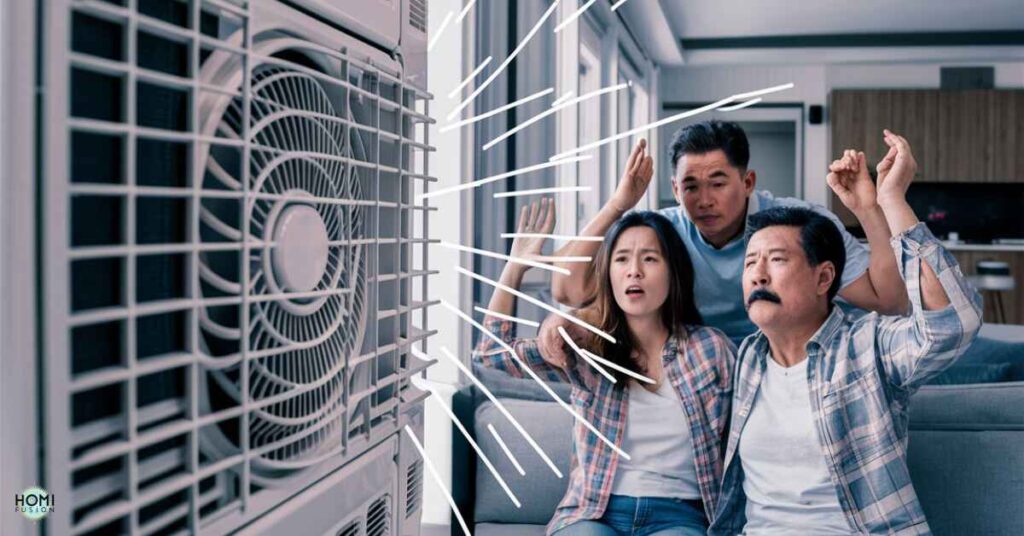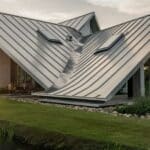Your new AC noise loud indoors due to several factors. Poor installation can cause vibrations. A larger unit than needed creates more noise. Ductwork issues can amplify sounds.
Dirty filters or ducts restrict airflow, leading to noise. An older AC might naturally be louder. Regular maintenance can reduce indoor AC noise.
Should New AC Units Be Loud?
New AC units shouldn’t be loud, excessive noise indicates potential problems. Modern units are designed for quiet operation. Factors like improper installation or oversized units can cause noise. Regular maintenance helps keep noise levels low.
A noisy AC may signal issues like loose parts, worn-out components, or airflow problems. Consult a professional if your new AC unit is excessively loud.
Causes of Air Conditioner Noises
Here are some causes of air conditioner noises:
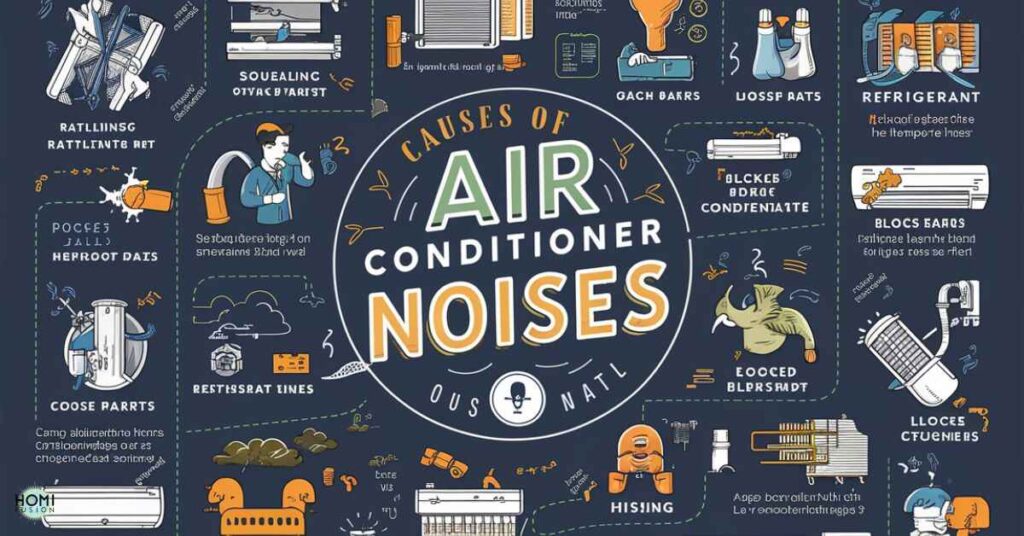
Electrical Issues: Faulty wiring or electrical components can lead to buzzing or humming sounds.
Broken Parts: Malfunctioning fan blades, motors or compressor components can produce clanking or rattling noises.
Loose Components: Loose screws, bolts or other parts can create vibrating or banging sounds.
Trapped Debris: Debris like leaves or twigs stuck in the unit can cause clicking or scratching noises.
Improper Installation: Incorrect installation can result in air leaks, leading to whistling or hissing noises.
Wrong Size of AC Unit: An oversized unit may cycle on and off frequently, causing loud noises.
Dirty or Clogged Air Filters: Dirty filters restrict airflow, leading to whistling or whooshing noises.
Loose or Damaged Parts: Loose belts, damaged fan blades, or worn-out bearings can cause squealing or grinding noises.
Vibrations and Noise Transmission: Vibrations from the compressor or other components can transmit noise through walls or floors.
Inadequate Insulation: Poor insulation can allow outside noise to enter the home through the AC unit.
Fan Issues: A malfunctioning fan motor or blade can produce loud humming or buzzing noises.
Ductwork Issues: Leaky or damaged ducts can create whistling, rattling, or banging sounds.
Manufacturer Support: Contact the manufacturer for troubleshooting guidance or professional repairs if you’re experiencing persistent AC noises.
Read this blog: How High Is A TWo Storey House
Common Types of Air Conditioner Noises and their solution
Here are some common types of air conditioner noises and their reasons:
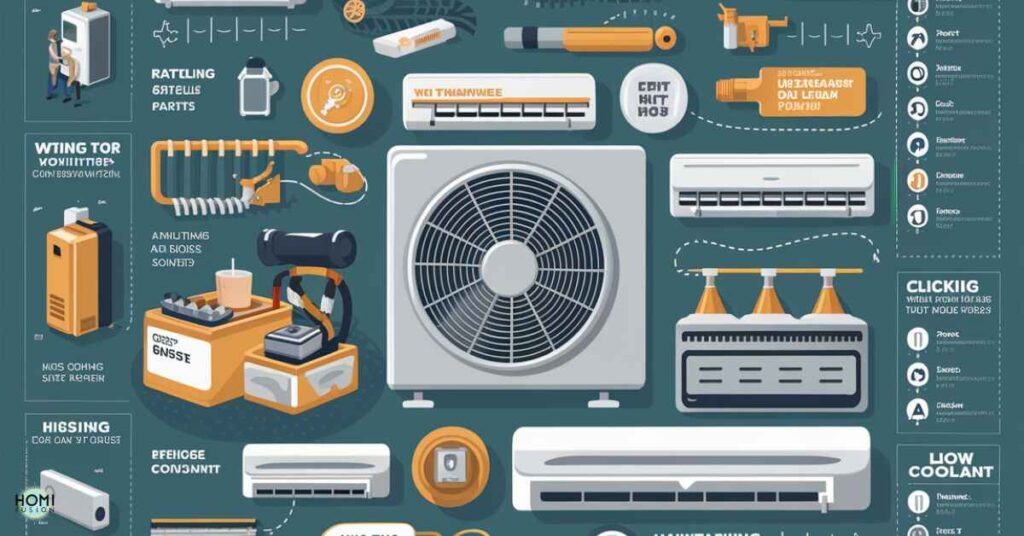
Banging Noises:
The loud noise is typically caused by loose or broken parts like fan blades or motor mounts. These issues require immediate attention to prevent further damage.
Screeching Sounds: Often indicate belt or motor issues, requiring inspection and potential replacement to ensure optimal AC performance.
Humming Noises: Electrical problems may result, such as faulty capacitors or compressor issues. These issues necessitate professional diagnosis and repair.
Buzzing Sounds: Can be due to loose components, refrigerant leaks, or electrical issues, requiring thorough inspection by a technician.
Rattling Noises: Often caused by loose screws, bolts, or debris in the unit, needing tightening or removal to eliminate the noise.
Clicking Sounds: Commonly associated with electrical faults or thermostat issues, necessitating prompt investigation and repair.
Hissing Noises: Typically indicate refrigerant leaks or ductwork problems, requiring immediate attention to prevent system inefficiency and potential health hazards.
Bubbling Sounds: Often caused by refrigerant leaks or moisture buildup, indicating a serious issue that needs professional repair to maintain AC functionality.
What Are the Signs of an Air Conditioner Refrigerant Leak?
Signs of an air conditioner refrigerant leak include:
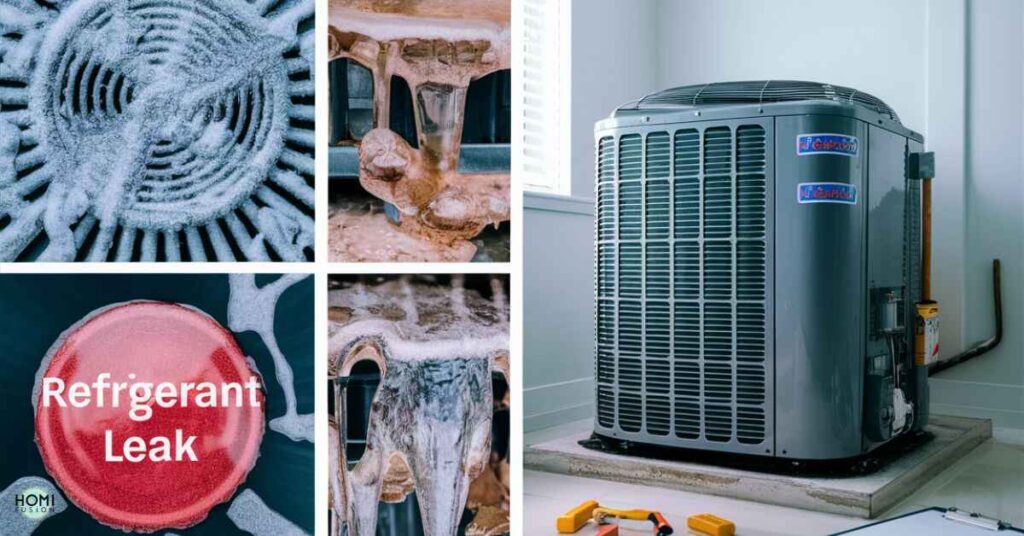
Reduced Cooling Performance: If your AC is blowing warm air or struggling to cool your space despite running continuously, it could be due to a refrigerant leak.
Increased Energy Bills: A refrigerant leak causes your AC to work harder to maintain the desired temperature, resulting in higher energy consumption and increased utility bills.
Hissing or Bubbling Noises: If you hear hissing or bubbling sounds coming from your AC unit, it could indicate a refrigerant leak.
Ice Buildup on Evaporator Coils: Insufficient refrigerant levels can cause ice to form on the evaporator coils, reducing airflow and cooling efficiency.
Visible Refrigerant Leaks: In some cases, you may notice oily or wet spots around the AC unit, indicating a refrigerant leak.
Warm Air From Vents: If the air coming from your vents feels warm or less cool than usual, it could be a sign of low refrigerant levels due to a leak.
Frozen Refrigerant Lines: A refrigerant leak can cause the refrigerant lines to freeze, leading to reduced cooling capacity and potential damage to the system.
Short Cycling: The AC may cycle on and off frequently, unable to maintain a consistent temperature, which is a common symptom of a refrigerant leak.
If you suspect a refrigerant leak based on the above signs, it’s essential to contact a professional HVAC technician for inspection and repair. Continuing to operate your AC with a refrigerant leak can damage the compressor and other components, leading to costly repairs or system replacement.
How Do You Clean an AC Condenser?
Cleaning an AC condenser is crucial for maintaining efficient cooling and prolonging the lifespan of your air conditioning system. Here’s how you can clean an AC condenser:
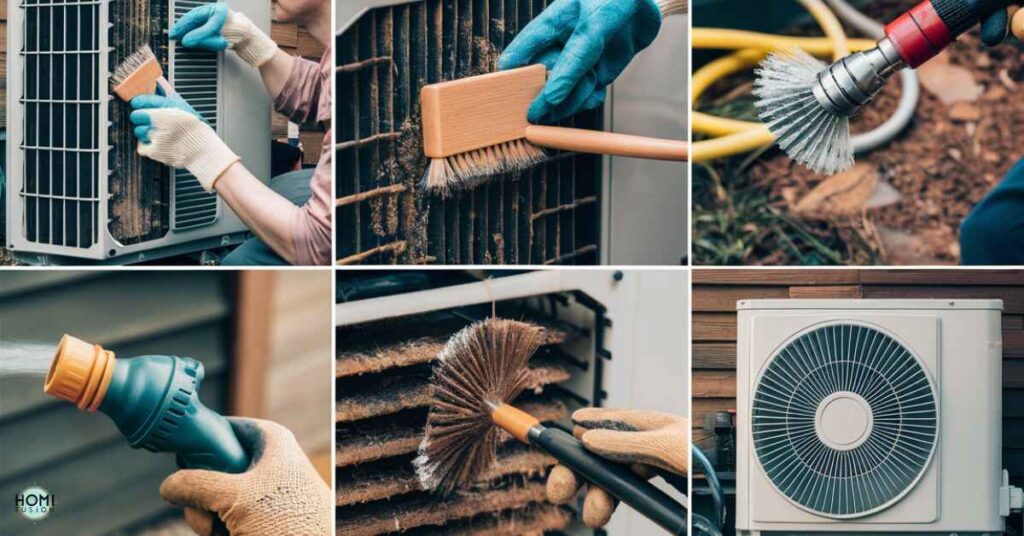
Turn Off Power: Before starting any cleaning, ensure the power to the AC unit is turned off at the circuit breaker or disconnect switch.
Remove Debris: Clear away any debris such as leaves, branches, dirt or grass clippings from the exterior of the condenser unit using a brush or vacuum cleaner with a soft brush attachment.
Clean the Fins: Use a garden hose with a gentle spray nozzle to clean the fins (metal blades) of the condenser. Spray water from the inside out to avoid bending the fins.
Apply Cleaner: For stubborn dirt or grime on the fins, you can use a commercial AC coil cleaner or a mixture of mild detergent and water. Follow the manufacturer’s instructions for the cleaner and apply it to the fins.
Rinse Thoroughly: After applying the cleaner, rinse the fins thoroughly with clean water using the hose. Ensure all the cleaner and dirt are washed away.
Check Drainage: Inspect the condensate drain line to ensure it is clear and free from blockages. Use a pipe cleaner or a wet/dry vacuum to remove any clogs.
Inspect and Replace Filters: Check and replace the air filters in your AC system if they are dirty or clogged. Clean filters improve airflow and overall system efficiency.
Trim Vegetation: Trim any vegetation or shrubs around the condenser unit to maintain at least a two-foot clearance for proper airflow.
Turn Power Back On: Once you’ve completed the cleaning and maintenance tasks, turn the power back on to the AC unit and monitor its performance to ensure everything is functioning correctly
Also read: Why Is It Humidity In My House
Frequently asked questions
Does a loud air conditioner use extra electricity?
No, a loud air conditioner does not necessarily use extra electricity. The noise level is not directly correlated with energy consumption.
How to reduce air conditioner noise inside?
To reduce air conditioner noise inside, consider installing soundproofing materials around the unit and ensuring proper installation and maintenance to minimize vibrations and rattling.
How to fix loud AC?
To fix a loud AC, tighten loose components, clean or replace dirty filters, check for ductwork issues, and schedule professional maintenance to address any underlying problems.
Is a loud AC bad?
A loud AC can be a sign of underlying issues such as loose parts or inadequate maintenance but doesn’t necessarily indicate a major problem. Regular maintenance can help address and prevent excessive noise.
Why does my AC sound like an airplane?
Your AC sounding like an airplane could be due to a malfunctioning fan or compressor, loose parts, or airflow restrictions, requiring professional inspection and repair to resolve the issue and restore quiet operation.
Conclusions
Your new AC may be loud due to installation problems or oversized units. Incorrect ductwork can amplify sounds. Dirty filters restrict airflow and increase noise. Regular maintenance can reduce AC noise levels significantly.
Consult professionals for specific solutions and adjustments. Properly sized units and well-maintained systems should operate quietly.

